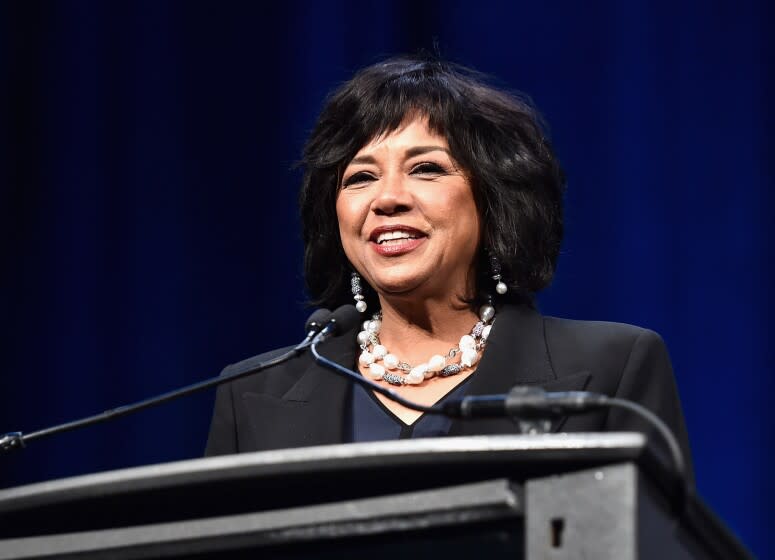Company led by former academy president offers to buy the Golden Globes

- Oops!Something went wrong.Please try again later.
Pacific Coast Entertainment, a group led by former motion picture academy President Cheryl Boone Isaacs, this week made a multimillion-dollar bid to buy the Golden Globes.
The offer includes paying Hollywood Foreign Press Assn. members an annual salary of $120,000, guaranteed for five years, along with a one-time $100,000 "Pandemic Relief Grant," and establishing a $5-million-a-year endowment, according to a term sheet reviewed by The Times.
Pacific Coast Entertainment would "obtain all rights and privileges associated with the ownership of the Golden Globe Awards Show," as well as "intellectual property privileges." The group "also seeks to have influence on the strategic direction of the HFPA and guide its transformation and governance," according to the offer.
"While we are waiting on formal indication that the HFPA has instituted a fair and transparent process whereby we may present our partnership proposal to you in person, we recognize time is of the essence," wrote Boone Isaacs and her Pacific Coast partner Yusef D. Jackson in an email sent Monday to the association's members, board of directors and President Helen Hoehne.
"The HFPA and its financial advisors have laid out a process to review proposals from any interested parties," HFPA spokesman James Lee said.
"That process involves working with [investment bank] Houlihan Lokey as previously announced. Continued mass emailing of members is not the process agreed upon by the Special Committee and is counterproductive to a thorough, comprehensive review. We hope any interested parties follow the correct process."
In a statement, Marcy Simon, a spokesperson for Pacific Coast Entertainment, said: "We are committed to honoring the 80-year legacy as a leading nonprofit organization for journalism covering film and television and celebrating it around the world. The PCE proposal is clear: we will compensate the foreign correspondents who comprise the HFPA based on a structure that provides a competitive salary. PCE fully affirms and supports the HFPA’s independence and right to maintain its status as a non-profit, membership based organization, as defined under IRC (c)(6)."
The offer is the latest proposal to buy the HFPA as the organization attempts to move beyond a period of turmoil.
For months, HFPA's interim chief executive, Todd Boehly, has signaled his intent to purchase the association under his private equity firm, Eldridge Industries, and transform it into a for-profit venture.
Boone Isaacs was the first Black president of the Academy of Motion Pictures Arts and Sciences, the group that presents the Oscars. Under her tenure, the academy made strides to diversify its membership, nominees and winners.
Last year, NBC dropped the broadcast of the 2022 Globes show, a contingent of powerful publicists boycotted the organization, and studios including Netflix and Warner Media cut ties after The Times’ investigation raised questions about the group’s ethical and financial lapses and revealed that not one of the then 87 members was Black. The HFPA has since added 21 new members, six of them Black, and hired a chief diversity officer.
Under terms laid out in Pacific Coast Entertainment's term sheet, the firm would contribute 20% of its HFPA-related revenue to support the association's ongoing operations, including "the development of its web and social media presence, research support for Members, professional development, marketing/communications support, management of its foundation, and other activities of the Association."
The endowment — as much as $5 million annually — will be used to "support the efforts and careers of the Members."
Further, the offer describes structuring the members' annual salary "at a level high enough to provide an economic foundation on which any Member, at any stage of their career, can build, maintain and sustain their career independently with dignity and integrity."
However, the compensation plan is likely to raise further questions about the HFPA, already under scrutiny for a variety of apparent conflicts of interest. The remuneration of members as outlined in the deal will essentially make them employees of the HFPA and, therefore, paid Golden Globes voters.
The HFPA came under fire last year after The Times reported the nonprofit association paid its members nearly $2 million in fiscal 2021 for serving on committees and performing other tasks.
The Pacific Coast Entertainment proposal comes a week after the Hollywood Foreign Press Assn. announced it had begun a formal review "to determine potential outside strategic interest in its organization and assets." A special committee composed of independent HFPA board of directors, along with financial and legal advisors, will vet the proposals.
Under Boehly's proposal, Eldridge would form a new company and acquire the Golden Globes assets based on an “independent third-party valuation firm,” according to the plan’s bullet points reviewed by The Times. The proceeds would be used to fund the charitable wing of the HFPA.
The association’s tax-exempt status would be dissolved, and the new association would enable members “the opportunity to share in its profits, thereby giving them a stake in the success of the Globes.”
In additional to approval by members, the plan would also need a final sign-off from California’s attorney general.
Boehly, appointed interim CEO of the HFPA in October, is part owner of the Los Angeles Dodgers, Lakers and Sparks. He recently purchased the English Premier League soccer team Chelsea FC, along with a consortium of buyers. His firm Eldridge also owns stakes in the Beverly Hilton, the longtime home of the Globes awards ceremony, as well as trade publications, including the Hollywood Reporter.
Last month, several members of the HFPA openly questioned Boehly's proposal. One member called it a “corporate takeover” and a play for the group’s “intellectual property,” saying the plan would make the nonprofit HFPA a “subsidiary of his corporate portfolio,” according to the email obtained by The Times. “This project makes a lot of sense for Eldridge, but none for the HFPA.”
This story originally appeared in Los Angeles Times.

